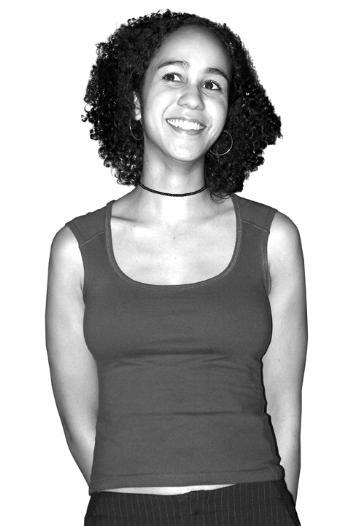
Home is Where the Art is
In the midst of last weekend’s blizzard, Thenjiwe N. Nkosi and studio-mate James W. Heisey-Rotner ’04 have created an oasis in their Linden Street painting studio. A Johnny Mercer song plays on the radio as Nkosi brews a pot of tea. The walls of the studio feature black and white paintings depicting buildings in Johannesburg, South Africa, where Nkosi spent much of her childhood.
“I’ve always just been making work about where I come from,” says Nkosi. In a drawing class freshman year, she found herself drawn to the theme of shovels. “I’ve been to a lot of funerals in South Africa,” she explains, “and I was using earth colors that reminded me of the red dirt of home.” She then expanded into painting historic sites like Robin Island, where Nelson Mandela was exiled. These paintings, she says, “represented a past regime that my father lived through, something that is a part of my history but that I didn’t live through.”
Now, inspired by a series of snapshots taken in Johannesburg this summer, she has begun painting buildings. This new project has required her to expand her painting methods. “Because there’s no other color I have to make really important choices about the tonal variations.” She points to a section of the wall covered with color swatches she has mixed and given names like “Alley Shadow” and “South African Concrete.”
Nkosi has always been comfortable with different types of media. She graduated from the Johannesburg branch of the Waldorf School, one of a group of experimental schools worldwide. “It was just a very physical environment. You were always working with your hands,” she says. She learned knitting, basketmaking, bookbinding and weaving.
At Harvard, Nkosi maintains eclectic interests such as gumboots dancing, a form of South African dancing similar to African-American step dancing. She decorates her room with colorful shoulder bags and scarves to combat what she calls the “drab and bleak” colors of Cambridge. She practices Wing Chun kung fu, co-founded and edits Harvard’s African Magazine, and received a Mellon Mays Undergraduate Fellowship.
Nkosi has a quiet warmth about her that draws people in and disarms them at the same time. “Thenji is a real person. You can sit around and shoot the shit with her,” says Elliot G. Aguilar ’04, a friend from Quincy House. “She’s a really good storyteller. I feel like I’ve met all of her Greek family through her crazy stories.”
Nkosi’s ability to tell a story serves her well as a filmmaker. For her non-fiction video course, she is editing a video titled Crossing Night. For the past two summers, she has worked at Artists Proof, a community art studio in Johannesburg that specializes in printmaking. Nhlanhla Xaba, one of the studio’s founders, died in a fire while he was “crossing night,” or working all night in the studio. Nkosi’s film documents the creation of a project called “Reconciliation,” where the artists used pieces of debris from the fire to create a collage about coming to terms with the tragedy.
Nkosi responds viscerally to the video as it plays on a tiny screen in Sever Hall basement. “I love this man,” she says as one of the artists appears onscreen, singing. Later, she adds, “I don’t see my work in VES as work—I mean work in the sense that it’s a pain. I love being in the studio. I love editing, I think about it all the time.”
She is frustrated with people who dismiss her studies. She says people often ask “What are you really doing?” “People don’t really see art as an important thing. They don’t see what art can do for you, how it can change your life,” she says.
Nkosi is considering working at Artist’s Proof after college, although she wants to open her own community art studio in South Africa. She’s also considering getting a masters’ degree in art education, going to film school and traveling to Greece, where her mother is from, and making a film about her family background. Another path is creating a photo history of downtown Johannesburg, combining archival imagery with her photos and interviews into a book.
For now, Nkosi is focusing on language acquisition. “I speak Afrikaans, very bad Greek, bad French, bad Zulu,” she says. “I’m going to remedy at least the Greek and the Zulu in the next few years.”


